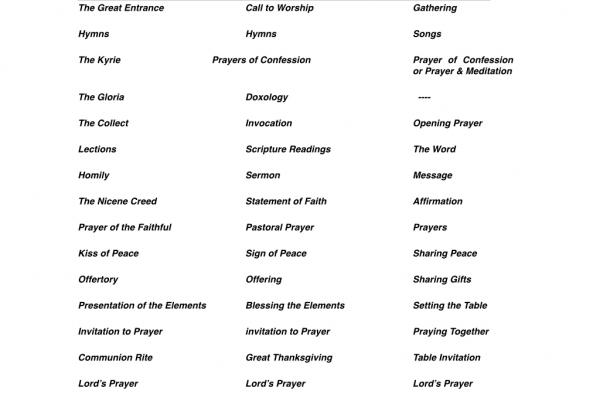Star Trek’s High Chancellor Gorkon raises his glass: “I offer a toast to the undiscovered country.” And then Mr. Spock chimes in: “Hamlet, Act 3, Scene 1.” The scene goes on to reveal that each group does not understand the language and actions of the other, but is willing to be at table together, uncomfortable though it may be. Both realize that they must forge together. And then a Klingon asks Captain Kirk if he would be willing to leave Star Fleet, intimating that for the future to happen, something must be given up.
When I was a girl watching the various iterations of Star Trek with my daddy, I didn’t know that it would be helpful in church dynamics, much less worship planning. But often I return to my favorite Star Trek movie, The Undiscovered Country, and find that from early on I was being formed to bring people that have differing cultural assumptions — differing languages — together at the table.
I often find myself in churches listening to arguments about which language (traditional, contemporary, emergent or other) sounds best for Shakespeare when recited in worship. I wonder though, are we, those who find ourselves at the table of the church, week to week, using what we thought was ours? Do we just use words that we have seen over and over without giving thought to them, what they say to others, what they truly mean to the sacred outsider? Or do we find ourselves trying our best, difficult though it may be, to use a language that speaks to those with whom we have often disagreed, or those who are the un-, de- or not-yet-churched? How far are we willing to go to spend our word capital on “those Klingons?”
Paul understood something of using words. In Romans he writes:
“First, there’s the matter of being put in charge of writing down and caring for God’s revelation, these Holy Scriptures. So, what if, in the course of doing that, some of those Jews abandoned their post? God didn’t abandon them. Do you think their faithlessness cancels out his faithfulness? Not on your life! Depend on it: God keeps his word even when the whole world is lying through its teeth. Scripture says the same: Your wordsstand fast and true; Rejection doesn’t faze you. But if our wrongdoing only underlines and confirms God’s right-doing, shouldn’t we be commended for helping out? Since our bad words don’t even make a dent in his good words, isn’t it wrong of God to back us to the wall and hold us to our word? These questions come up. The answer to such questions is no, a most emphatic No! How else would things ever get straightened out if God didn’t do the straightening?”(Romans 3:2-6, from The Message)
When it comes to inviting people to our sacred space, sitting with them in the realm of God at the expansive table, I really do not think it matters if we use an ancient, traditional or the newfound alternative term (see accompanying chart). What I think matters more is that they are invited. And that when they come, how awkward or welcoming will we find ourselves? In the context of your worship gathering, I’m wondering if you are the Klingon or the Trekkie? Are you revealing the love that God is engendering among us, or perpetuating a trite and tired myth of how it used to be?
As the Trekkies say goodbye to the Klingons, the departing the chancellor remarks to Captain Kirk: “You don’t trust me; I don’t blame you. If there is to be a brave new world, our generation is going to the have the hardest time living in it.”
Suzanne Castle is a popular speaker, artist, and author, currently serving University Christian Church in Fort Worth where she is the Worship Architect for The Search. She received her doctor of worship studies from the Robert Webber Institute for Worship Studies in 2011 and is proud of her latest creative activity, Brim: Creative Overflow in Worship Design, with co-author Andra Moran. Suzanne is a former professional ballerina and actress, and spends her time creating ways to live out being a revolutionary in the movement of Christ in unique ways. www.suzannecastle@me.com or visit www.seekingthesacred.org.
Got something to say about what you're reading? We value your feedback!
